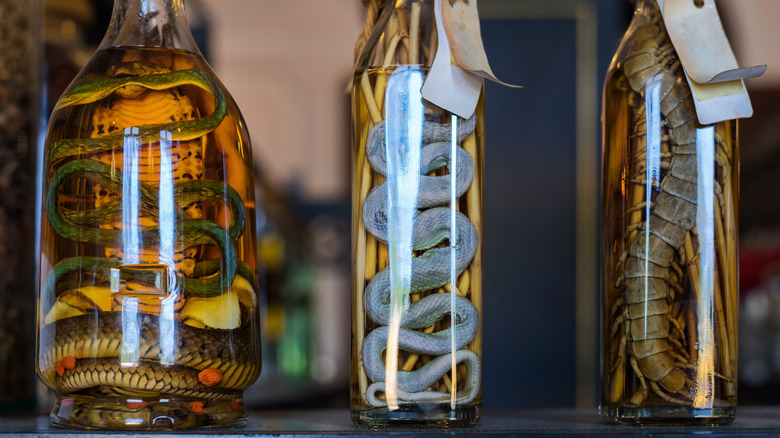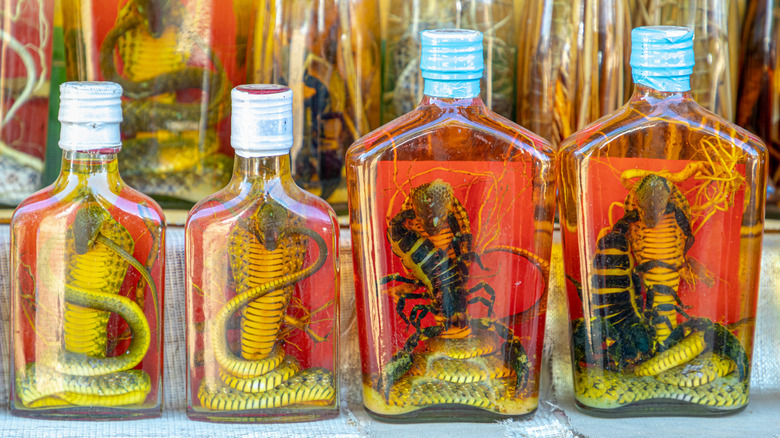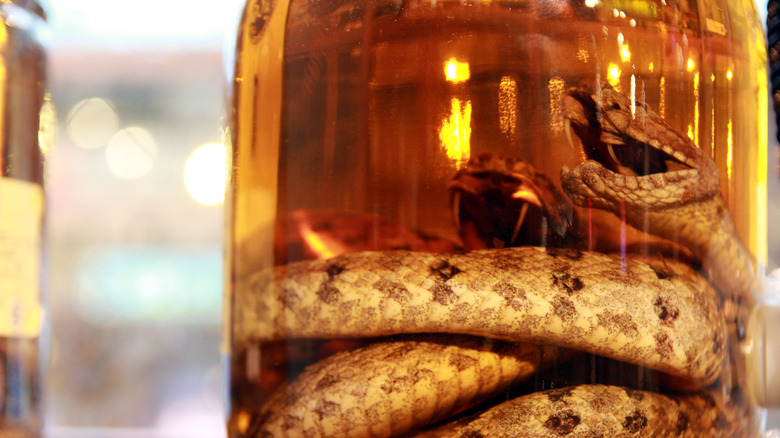What Is Snake Wine, And Is It Safe To Drink?
In Chinese culture, snakes symbolize a range of meanings — from craftiness to luck, fortune, or longevity. For centuries, its association with longevity has inspired the consumption of snakes in various forms in East Asian and Southeast Asian dishes.
Many believe that consuming snakes will help to ease or cure the symptoms of several ailments, including vision issues, hair loss, joint pain, and chronic illnesses. Some research has even suggested that snake venom may be potentially useful in supporting those with breast cancer, cervical cancer, and leukemia from future bodily damage.
Snake soup is one of the more popular delicacies but there are a number of preparations for the slithery serpent — from snake-skin casseroles and fried snake meat to snake gallbladder soup. Simply drinking the snake's blood (after removing its head) from a shot glass isn't unheard of either. However, there's another way to get your daily dose of the cold-blooded reptile: snake wine.
What is snake wine?
Snake wine is often sold in large clear jars in markets throughout East Asia and Southeast Asia. It's simply made by adding a large live snake (often a cobra or viper) to a jar of rice wine or grain alcohol, then sealing the lid, and allowing it to age for several months. Sometimes other ingredients like berries, herbs, or ginseng — or even geckos, smaller snakes, and scorpions — are added as well to infuse more flavor into the wine.
Depending on who makes the wine and what ingredients are added, the flavor of snake wine varies. But when it's made from rice wine it can have a faint resemblance to sake. BBC Travel quotes writer Eddie Lin as describing snake wine as "straightforward: rice wine with a protein finish, like a fishy chicken." Times of India also notes the presence of a fish or chicken flavor can make the concoction earthy and sweet.
Is it safe to drink snake wine?
Since the snake has been submerged in alcohol, its venom becomes neutralized. Supposedly, this means that there is no danger of becoming ill from drinking the wine. However, there are a few incidents that may give a potential snake wine swiller pause. Before imbibing it, it's best to review these criticisms too.
In 2013, a woman named Liu living in Shuangcheng was reportedly using snake wine to help with her rheumatism. Liu stored her snake wine in a bottle with a spigot that she opened to pour the wine. Despite having been soaking in the alcohol for three months, when Liu removed the top of the bottle to pour in more alcohol, the snake leaped from the jar and bit her finger.
Additionally, in 2022 it was reported that a man in the Heilongjiang province was trying to treat his son's illness using homemade snake wine. He too found that all three of the snakes he had inserted into bottles of alcohol — for approximately a year prior — were still alive. One sprung from the container and bit him as well. While both, fortunately, survived their respective attacks, their experiences may act as a caveat against crafting some snake wine.


